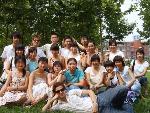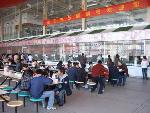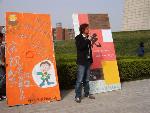- Getting around Lijiang. Dont stay in the Old Towns more than 2 days, there is nothing to do. KRISS Oct 9, 2013 05:46
- 2013 Beijing Temple Fair BENNYLAU Feb 26, 2013 03:29
- Malaysian traveling from KUL - LAX vis Shanghai PVG ZATI_DY Jan 3, 2013 20:15
Travel Review Special: Being a foreign teacher in China
- Views: 5815
- |Vote: 0 0
- |Add to Favorites
- |Recommend to Friends
Introduction
Like some of TCG's other columnists, I am living in China because I am working as an English teacher. It's seems the ideal way for somewhat more adventurous people to make a living abroad for a while, and I get many questions about the 'how and what' of teaching English in China. And after Tom Carter's "The truth about teaching English in China" I would also like to share my personal experiences about this topic with you.
A note of warning first: Please keep in mind that all the things you are going to read are my personal experiences and my personal views. Even though some things described both in Tom Carter's article as well as in my story below contain some kind of a more general truth, other things are highly dependant on the place and institution where you are employed at, your personal circumstances, attitude and so on. Okay, you are now fully prepared to read my story about teaching in China:
[Picture: Class Photo]
The ideal way for an extended holiday?
This is was most people think I am doing here. Having a long, luxurious holiday in an exotic land all expenses paid. This is also what attracts a lot of people to become an English teacher abroad. Well, I think you can summarize this job in many ways, but an extended holiday is certainly not one of them.
I personally didn't expect it to be, because before I came to China to be a full time teacher, I had already been in this country before as part of a 3 month volunteering project. During these 3 months I worked in rural Shanxi province as a farmer. Well, as a farmer's assistant to be more exact. I lived in the house of a small town peasant and helped him sow, plough and harvest. But because of the sometimes severe Shanxi summer heat, working on the field in the sweltering afternoon hours often was simply impossible. So instead I gave English classes at the town's primary school. I remember being not only shocked by the poor conditions within the school and the archaic teaching methods (consisting of nothing but reciting the teacher words) but mostly by the fact that I simply wasn't even able to communicate with the school's English teachers. Their pronunciation being so poor and their vocabulary so limited that any conversation (except for naming colors, animals and fruits) was impossible.
I am telling this story as to illustrate that the general level of English in China is very low. Even most university students who major in English have big trouble making decent conversation; and what they say is difficult to understand due to their sometimes unintelligible Chinese accent. This is also the reason why foreign teachers are being welcomed to China; their numbers increasing every year.
[Picture: Your typical student canteen]
Motives & Finding a job
My decision to return to China to be a full time teacher was based on several reasons. The main ones being: a chance to improve my Mandarin Chinese, looking for new ways to train my didactic skills and more generally to learn and train my abilities by placing myself in an unfamiliar situation (living abroad). Of course having the chance to travel in great places in the holidays was a motive too, but not a main one. And I think it really shouldn't be; because otherwise you're in for a disappointment.
Although most people find a job as a teacher by surfing to one of the many foreign-teacher-recruiting-websites on the internet and then applying online for one; I asked one of the people I had met during my volunteering project in China to help me look for a suitable position. I wanted to work in a college and in a bigger city; and that is how I ended up working at a university in Xi'an
The foreign colleagues
Unlike some other people I have spoken, I wasn't cheated in any major way by the university that hired me. I got the promised salary, the room was comfortable and the campus a green haven in Xi'an's urban sprawl. Of course there are always small things. To give some examples; the promised washing machine wasn't there and contrary to what the contract says the overtime hours are generally left unpaid. But if you are a person willing to fuss about those things, you'd better not come to China to teach at all. A flexible approach is really a basic necessity.
So, I wasn't disappointment by the conditions on the campus in any way. I wish I could say the same for my foreign colleagues. Perhaps I was naïve, but I expected a motivated and cooperative team of foreign teachers. I thought we had a common goal of providing the students a dynamic and effective learning environment, and that we would closely collaborate as a team; share experiences, improve our skills whilst creating a pleasant working atmosphere. Well, I was wrong.
I have worked in China for a quite a while now and therefore have met many foreign teachers. Most of them are not in China because they particularly like the country and certainly not because they like teaching so much.
After a while, I started to see categories in the motive of foreigners working as a teacher in China:
Type 1: The gold digger
Because of the enormous growth of the Chinese economy and the media hype surrounding it, some people seem to think China is the Promised Land; the new country of endless possibilities. And they want a piece of this fresh pie! Being a teacher here provides these people with both the required residence permits and a steady basic income.
Teachers who are working here with this intention, are your colleagues who are always in a hurry. They work in five different schools, are trying to set up several companies themselves and are always comparing salaries and talking about how to get more fresh yuan notes pouring in. They generally don't like teaching but as long as it keeps making them good money they can push those feelings of dislike aside. The classes they give or not at all bad. They're well prepared and serious; perhaps just rather uninspired. Of course they don't take part in any other aspects of campus life, because they don't get paid for those things and they have better ways to spend that time.
Type 2: The status seeker
Finding a job as a foreign teacher in China is E-A-S-Y. You don't need reference letters, you don't need teaching experience, big chance there isn't even a face-to-face interview; just the fact that you are a native English speaker or even the simple fact that your face is white, is enough to get a job as a teacher. A job which provides you with a decent salary and a comfortable place to live in. Moreover; a job in a country where white faces are generally treated with respect and more often than not treated with a courteousness that in the West only the royals or the rich and famous are used to.
Naturally this attracts some type of people who love having a certain status, but somehow can not get it in their own country. Often these types are elderly, single men that have done 1000 different jobs in their home country but failed in each and every one of them. In China a good resume is of no importance and all of a sudden these foreigners find themselves living in comparative luxury and being the center of attention. And they simply thrive on that.
These are your colleagues that make cheesy jokes about female students, are always talking about how happy they are the mini-skirt is a fashion hit in China too and often end up having a Chinese wife within 6 months after their arrival.
As teachers they feel their mere presence in the class is enough. The main part of their class therefore consists of talking about themselves are playing foolish games, like a 30-minute session of “stand up, sit down" If they have a bad day, they fill a 2 hour class by letting the students write an essay which they throw in the bin once they are back in their apartment.
Okay, I am getting a bit cynical here; but I am in no way exaggerating. I have (unfortunately) experienced several colleagues of this 'species' and believe me; these are the colleagues you can do without.
Type 3: The adventurers
Not long ago backpacking through Asia, South-America or Australia was the 'hottest' way to spend your break year or sabbatical. Recently it seems that (at least in Asia) working as an English teacher is the new trendy way of spending some time abroad. Especially recent graduates increasingly regard this as an ideal (and low-budget) way to envelop themselves in a foreign culture for a while. The money they make teaching is used for travel in the weekends and holidays.
This kind of colleague is generally young and open-minded. They feel teaching should be fun and can easily identify with the students. During weekdays they take part in other aspects of campus life; but in weekends and holidays they are out traveling or partying. Monday mornings are not their best time. Although they sometimes overdo the fun-element in the class a bit; these people have the least trouble getting the shy Chinese students to actually speak.
Now of course I am stereotyping a bit here. But mind you; stereotyping isn't equal to untruth or grave exaggeration. When people choose to work on the other side of the world they always have a good motive for doing so. So, above I just mentioned the 3 most common ones, and the personality and working attitude that usually goes with that particular lead motive.
[Picture: Pep-speech for shy students "Don't be shy, just try!"]
The other colleagues
Besides these fellow foreigners there are of course also your Chinese colleagues. However, on most schools and institutions the foreign teachers are treated as a completely separate group. They have certain privileges such as better housing, higher salaries and –often- longer breaks. Yet, being treated as a separate campus-mini-community also means isolation from everything else that goes on at school. Customarily, foreign teachers are not invited to things like staff meetings, student progress discussions, special ceremonies, class photos and so on. We basically just teach classes according to a certain set of 'official order' and don't have any say in anything else that goes on at campus. Invitations to events, ceremonies and meeting often only depend on whether the photos taken will be used on the website or student recruitment brochures or if there will be some media coverage of the campus event.
Of course it depends on your own personality whether you like this relative isolation or not.
[Picture: Sunny campus scene]
The students
As Tom Carter also writes in his story about being a foreign teacher in China elsewhere on this website; one shouldn't underestimate the work. Hours are long and teaching the same class for sometimes up to 12 or 14 times a week can be tedious. You also shouldn't be surprised by the study attitude of some Chinese students. While there are many highly motivated students in every class; you'll also experience an equal amount of pupils who are just in class 'cause there parents told them so and paid a fair amount of money for it too. They don't like their major and spend their days in class by sending text messages on their telephone, listening to their MP3 or just sleeping with their heads and arms spread out over their desks. Although this behavior in class is unheard of in the West; it is generally accepted by the Chinese teachers. "I am not a force feeder" and "as long as they are quiet, they can do anything they like" are their mottos.
As for me; I can't accept it. Obviously I try to make my classes as interesting as possible; fun and educative. If they still prefer their cell phone games; they can play them outside.
Still, like I said; there are also many fantastic students. They study hard and do their best to participate in class. Although it is sometimes hard for them to speak out (especially in a don't-lose-your-face-society) they practice as often as they can; and it is amazing to notice the progress sometimes made in the mere 4 months a semester lasts.
Teaching is in China considered as an ideal starting-your-career job; and the bulk of the Chinese teachers are therefore often only a few years older than the students themselves. In China this doesn't give any authority problems and outside of the class, students just treat the teacher as one of their campus friends. They go shopping together, have dinner together etc.
Since this is very uncommon in my country, I really felt uncomfortable in the beginning when a student invited me for dinner or something similar. I didn't want to give students my cell phone number since I considered that too private and I refused presents they offered me (thinking they were either trying to bribe me or appallingly sucking up to the teacher) It wasn't until I was here I few weeks that I realized that I was thinking the Western way of student-teacher relations, which is completely different then the Chinese one. So I stopped trying to maintain that professional distance outside of class (during class it is different of course) and tried to make friends with the students. And I am glad I did so; because this is what made being a teacher in China such a great experience for me.
[Picture: Student dorm]








 Copyright © 1998-2026 All rights reserved.
Copyright © 1998-2026 All rights reserved.
1.
Feb 18, 2013 03:50 Reply
Mr.WAIJIAO from China said:
I take umbrance to the following statement:
"Moreover; a job in a country where white faces are generally treated with respect and more often than not treated with a courteousness that in the West only the royals or the rich and famous are used to."
The fact of the matter is that the inverse is true. Foreigners are often treated with disdain due to the rampant racism and propaganda-induced (read: brainwashed) nationalism pervasive in Chinese society. Many will attempt to take advantage of the unassuming foreigner, who naively believes that the Western/Judeo-Christian notion of "doing the right thing" for the sake of doing that which is "right" is a universal value. In China, a more transactional ethical system exists. It is one in which the individual should pursue that which is in his or her best interest at all times. Therefore, even when one shows honor to others, he or she does so for the sole purpose of benefiting himself or herself.
The only sense in which this statement is reflective of reality is that those working outside of the largest urban centers in the Eastern part of China will be subjected to incessant stares wherever they go. The staring is not, however, the type reserved for a rockstar (except when offered by a fawning young female). Rather, it is the type of eye-balling reserved for an extra-terrestrial whose ship has crashed in the Middle Kingdom.
Of course, you are entitled to your perspective, but this waijiao begs to disagree.